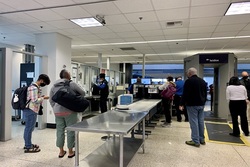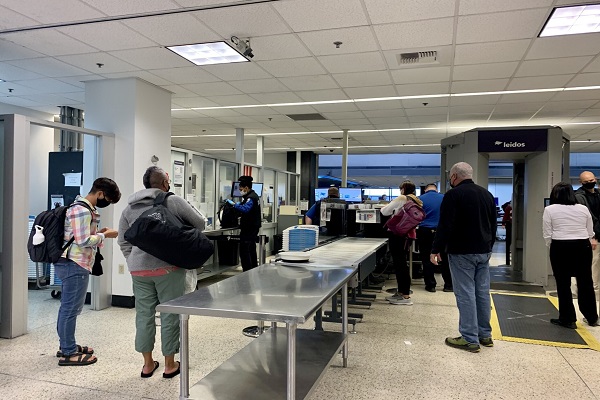Muslim Family Given Second Chance in Lawsuit over US Airport Searches


Mohammed Jibril, a US citizen of Jordanian national origin, his wife Aida and five children were ready to take a flight as part of their regular, religious-based trips to Jordan back in 2018. But when they got to the airport they experienced something new: after an hour-long wait, their boarding passes were marked with “SSSS.”
This acronym, they would later learn, stands for Secondary Screening Security Selection and acts as a signal for Transportation Security Administration agents to further search the passengers and their baggage. Mohammed was separated from his wife and children, one as young as 2, and each was searched without their consent or a warrant, according to a lawsuit they filed in Washington federal court two years ago.
This treatment allegedly lasted for hours both when they left Los Angeles at the start of their trip and again when they landed in Jordan. The return flight went just as poorly, the family claims. A layover in Abu Dhabi saw the family again searched and questioned, they say, and the delay was so extensive they missed their connecting flight and had to stay the night. The next morning they allegedly faced more searches and detainment before they were finally allowed to board a plane home.
The family's lawsuit was filed against the TSA and Department of Homeland Security, alleging Fourth and Fifth Amendment violations related to the federal system designed to give those subject to possible terror watch list status a chance at redress.
But their claims failed to sway US District Judge Royce C. Lamberth, who dismissed their case for lack of standing. According to the Ronald Reagan appointee, the Jibril family's extensive travel history, including more than a dozen trips in the last 25 years, showed the singular incident in 2018 was not enough to show they’d face such searches again.
“All plaintiffs claim to have travelled to Jordan every two to three years, yet only on one trip have they encountered these difficulties,” Lamberth wrote in his May 2020 opinion. “These statistics, without more, do not suggest that defendants will subject plaintiffs to these supposedly unlawful searches in the future.”
But Jibril appealed, noting the SSSS marking on the family's boarding passes is a designation for those placed on the federal terrorism watch list and their attempts to remedy the situation using the DHS Traveler Redress Inquiry Program, or TRIP, rendered only a boiler plate response neither confirming nor denying their watch list status.
Their harrowing story appeared to satisfy the D.C. Circuit, which reversed much of Lamberth’s ruling on Tuesday.
“Because the Jibrils plausibly allege that they will travel again soon and that they will again endure the alleged illegalities, they have established an imminent threat of future injury,” wrote Senior US Circuit Judge Harry T. Edwards, finding the family has standing to pursue much of their challenge.
Edwards, a Jimmy Carter appointee, pointed specifically to statements made by federal lawyers during oral arguments which suggested if the Jibril family wants to find out if they’re on the watch list, they “can book another trip to see whether they endure the same problems that they faced in 2018.”
“Whether this suggestion was meant to be a tongue-in-cheek quip or simply a heartless argument, it makes no sense,” Edwards wrote.
The government's suggestion also stood out to Christina A. Jump, the civil litigation department head for the Constitutional Law Center for Muslims in America, who represented the Jibrils in the case.
“I appreciate the D.C. Circuit recognizing the inequity of asking the family, particularly with their minor children, to go through the harm again in order to prove something the government already knows,” Jump said, before expressing how thrilled she was by the three-judge panel's decision.
Still, she said, even the appeals court acknowledged the issues the Jibrils could face going forward, noting the government’s citing of national security as a shield to block the release of the family’s watch list status would be hard to overcome.
“Revisions to the TRIP policies may not exist that would allow the Jibrils to discover whether they are – or ever were – on the Selectee List,” Tuesday's ruling states.
Edwards was joined on the unanimous panel by US Circuit Judges Karen LeCraft Henderson, another Reagan appointee, and Justin R. Walker, a Donald Trump appointee.
Jump remains cautiously optimistic. The Jibrils are one of many clients she’s represented in similar claims and she’s seen a variety of outcomes.
She pointed to the standard form letter Jibril received, one she said all her similarly situated clients receive following TRIP inquiries, as possible grounds for relief.
“It’s not tailored to this individual’s specific complaint,” she said. “It’s an Administrative Procedures Act requirement that they look into these individual complaints with care and all that we are seeing is a cookie cutter, uninformative response.”
Attempts to reach DHS and TSA for comment were not returned by press time.
Source: courthousenews.com



